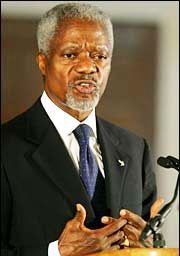Sudan agrees “in principle” to UN-AU force-Annan
Nov 16, 2006 (ADDIS ABABA) — U.N. chief Kofi Annan led a push on Thursday for a “hybrid” force of African Union and United Nations peacekeepers to be allowed into Darfur amid reports of new violence in Sudan’s war-shattered region.
 “It is agreed in principle that, pending clarification of the size of the force, we should be able to take it forward,” he told reporters at the African Union headquarters in Addis Ababa.
“It is agreed in principle that, pending clarification of the size of the force, we should be able to take it forward,” he told reporters at the African Union headquarters in Addis Ababa.
“The troops should be sourced from Africa as far as possible and the command and control structure would be provided by the U.N.,” he added.
Diplomats said Sudan had concerns over both the size of the force in Darfur and its command structure.
“The U.N. says 17,000 (troops), that figure is very high. We think 11,000 to 12,000,” said Sudan’s U.N. ambassador Abdalmahmood Abdalhaleem Mohamad.
The United Nations plan, which estimates say could cost more than $1 billion a year, also calls for 3,000 police.
The Sudanese envoy said government officials would respond to the latest proposal before the AU Peace and Security Council meets on Nov. 24 to discuss Darfur.
The West has pushed hard for a U.N. peacekeeping force to help the underfunded AU soldiers, but Sudanese President Omar Hassan al-Bashir has flatly rejected this and insisted the AU remain in charge.
With the clock ticking toward Dec. 31 when the AU’s extended mandate in Darfur expires, diplomats have been struggling to break the impasse over a protection force in western Sudan.
On his farewell trip to Africa, Annan summoned officials from the U.N. Security Council’s permanent members, the European Union, Egypt, Gabon and the Arab League to Thursday’s one-day talks on Darfur.
The AU also invited Libya, Nigeria, Rwanda, Senegal and South Africa.
“There is a mood for cooperation between the African Union and the U.N. giving technical support” like mine clearance, staff, logistics and radios,” Sudanese Foreign Minister Lam Akol said earlier on Thursday.
“But that must be coupled with pressure on all groups to respect a ceasefire,” he added.
Diplomats said AU and U.N. officials will meet rebels who did not sign the Darfur peace deal in the next two weeks.
“MASSIVE ESCALATION”
Violence, disease and hunger have killed some 200,000 people since 2003 and driven more than 2.5 million from their homes. Experts say since one of three rebel factions signed a peace agreement in May the violence has increased.
Before Thursday’s meeting began, Sudanese rebels accused government troops and militias of killing more than 50 people in an attack on their positions in north Darfur.
The head of one faction of the rebel Sudan Liberation Army (SLA) said government troops, backed by allied Janjaweed militia, attacked its positions in the Deir Mazza area on Wednesday, killing several rebels and the rest civilians.
The government had used fighter planes, Abdel Wahed al-Nur told Reuters, calling the attack “a massive escalation from the government” which would bring an SLA response.
A Sudanese army spokesman, who declined to be named, said the report was “100 percent incorrect”.
Akol blamed rebels for trying to undermine peace. “Unfortunately, when you have war, people die, which is why we are serious about ending it,” he added.
There was no immediate word from the AU.
U.N. humanitarian chief Jan Egeland arrived in Darfur on Thursday for a three-day trip but was told all of his proposed destinations were too insecure to visit.
Fighting between the government and Darfur rebels has spilled into both Chad and the Central African Republic.
Darfur erupted in 2003 when mostly non-Arabs began fighting for a bigger slice of power and resources, and the government in turn backed and armed Arab militia known as Janjaweed, who have pillaged, raped and killed villagers.
(Reuters)
